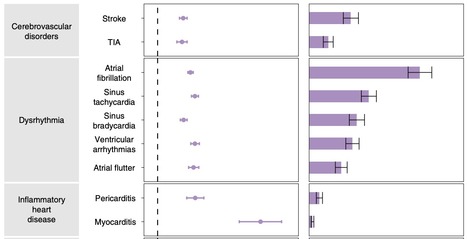Covid vaccinations substantially reduce the risk of heart failure and potentially dangerous blood clots linked to the infection for up to a year, according to a large study. Researchers analysed health records from more than 20 million people across the UK, Spain and Estonia and found consistent evidence that the jabs protected against serious cardiovascular complications of the disease. Covid vaccines, including those from Oxford-AstraZeneca, Pfizer and Moderna, proved highly effective at preventing severe disease in the pandemic, but medicines regulators also recorded increases in some rare heart and clotting conditions, similar to those found with other vaccines such as flu shots.
The latest study sought to investigate the overall impact of a Covid vaccination, given that infection with the virus itself is known to significantly raise the risk of heart failure and various other serious cardiovascular problems. “What we show in this very large study is that people who are vaccinated are at a very much reduced risk of these complications post-Covid,” said Daniel Prieto-Alhambra, a professor of pharmaco- and device epidemiology at the University of Oxford and a senior author on the study. Writing in the journal Heart, the researchers describe how the adenovirus-based Covid vaccines produced by Oxford-AstraZeneca and Janssen, and the mRNA-based vaccines from Pfizer and Moderna, were most protective against Covid-related heart failure and blood clots in the first month after contracting the virus. In that period, the risk of heart failure was 55% lower, and the risks of blood clots in the veins and arteries were down 78% and 47% respectively, compared with rates in unvaccinated people.
While the protective effects of the vaccines waned over the longer term, those who received Covid shots remained at lower risk of Covid-related heart failure and blood clots than unvaccinated individuals for up to a year, the researchers found. Three to six months after infection, the risk of heart failure in vaccinated people was 39% lower than in unvaccinated people, with the risk of blood clots in the veins and arteries down 47% and 28% respectively. From six to 12 months post-infection, the risks of the same complications were 48%, 50% and 38% lower, respectively, for vaccinated people. The protective effect arises from the vaccines reducing the severity of the disease when people experience breakthrough infections, when the virus takes hold despite a person being vaccinated. “The message overall is that if you are vaccinated, your risk of having post-Covid cardiovascular and thromboembolic complications is reduced quite dramatically,” Prieto-Alhambra said. “Particularly for people who are at high risk, or are scared of having cardiovascular complications or blood clots, this is very reassuring.”
Cites study published in 2024 in BMJ Heart:
https://doi.org/10.1136/heartjnl-2023-323483



 Your new post is loading...
Your new post is loading...









